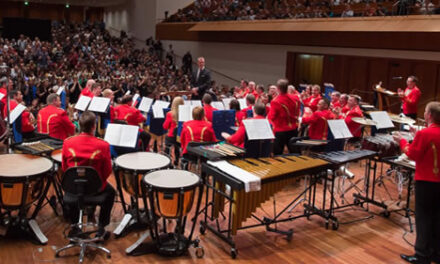You may be forgiven by the cognoscenti if you do not yet know the name of the Jupiter String Quartet. This young ensemble (Nelson Lee, Meg Freivogel, violins; Liz Freivogel, viola; and Daniel McDonough, cello), with three of the four still under thirty, is right at the beginning of what augurs to be a successful career, if we can judge by their performance for the Raleigh Chamber Music Guild at the Fletcher Opera Theater. The group got started on its way through participation in the Professional String Quartet Training Program at New England Conservatory in 2004 to 2006.
The conceit structuring the program they presented was three “last works” by three major composers — the last chamber work of Mendelssohn (the Quartet op. 80 in F minor), the last quartet of Britten, Op. 94, and the quartet in F, Op. 135 of Beethoven. Mendelssohn, despite the recent efforts of musicology, has yet to shed a certain aura of facility and light-weight which works against him in the deadly-serious context of Germanic art. The interpretation of the Op. 80 by the Jupiter gave me an incomplete vision of their possibilities. Even here it was clear that the playing was exemplary from a technical standpoint, but I had a dread feeling that for the program as a whole, the group would not go beyond the notes to the music (the “midi” syndrome). Rhetoric was lacking on several levels; from the inflection of the motive, to the structuring of the phrase, to the overarching expression of the music. Too often I heard motives repeated with no apparent reason, no change of presentation. If one repeats a phrase in conversation, it must be for emphasis, for some communicative reason, or there is some social disorder at work. The same should be true for music. Likewise, for a piece in F minor, the most expressive and perhaps desperate of keys, the whole effect was monochromatic, with no exploitation of musical color. Indeed, the affect of the players in this piece was deadening — it was impossible not to know that they were playing “serious” music.
With the Britten, we entered a different and better world, and one perhaps better suited to the Jupiter at this point in time. The clean, clear tones and excellent ensemble skills of the group brought out all the best in a modern music in which the rhetoric is more restrained. The central “Solo”movement was one of the most beautiful single moments of music that I have heard recently — beyond time. All in all, they delivered a convincing rendition of an infrequently-heard masterwork (and which curiously enough seemed to have echoes of the Shostakovich quartets).
When the Jupiter arrived after intermission at the Beethoven quartet, I realized finally what had been lacking earlier — finally the group could relax, enjoy itself, with smiles all around, at play, not at work, and this genial work was beautifully played at a level that could compete with much more mature ensembles.
It was a fine NC-debut program by a promising new ensemble. I hope that they will continue to explore the rich quartet literature of the 20th century.
Note: The Jupiter String Quartet will return to NC for a performance on the Classical Concert Series in Southern Pines on November 10, 2008.











